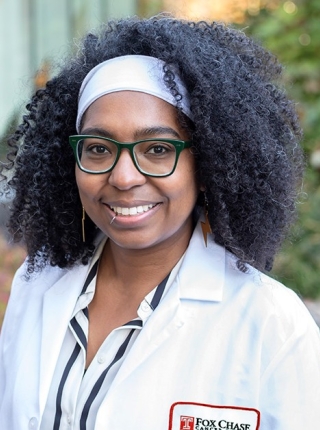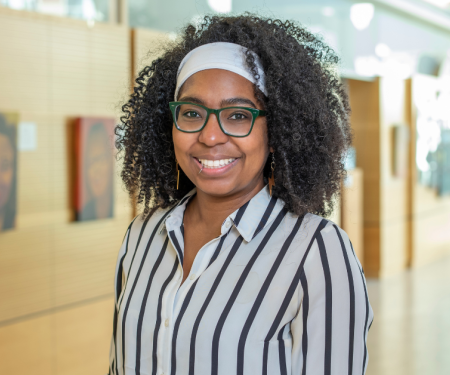Breadcrumb
- Home
- Jaye Gardiner
Jaye Gardiner, PhD

Research Mentor to Visiting Graduate Student
Assistant Research Professor, Fox Chase Cancer Center
Though my interests appear disparate, every activity I participate in is a step towards achieving my long-term goal of becoming an independent investigator and educator with a research program that: 1) provides better treatment options for patients, 2) studies how viral infections alter the extracellular environment and how these changes lead to cancer development (especially the rare pancreatic cancer), and 3) integrates science communication to enrich the experience of my students and increase public access to scientific research.
Research
Starting my academic aspirations under the tutelage of Dr. Nathan Sherer, for my graduate work I developed a two-color, long term, live-cell imaging platform to study the HIV virological synapse (VS). VSs are specialized cell-cell contacts that allow viruses to spread directly between infected and uninfected cells; reducing the distance and time required to infect a new cell. Mediated by the viral Envelope protein (Env), my work investigated how Env orchestrated the formation, stability, and turnover of the VS and how this alters cell-cell interactions (Journal of Virology 2016). Through collaborations, I was also able to explore how related viruses can have differential kinetics in their infections (Journal of Virology 2017) and exploit the most niche host biology (PNAS 2019). However, while observing how viral infection drastically changed cellular behaviors in my dissertation, my thesis committee broadened my intellectual framework by challenging me to consider how these behavioral changes may magnify the impact on diseases as cells modulate the extracellular matrix (ECM) for long distance intercellular communication (Royal Society of Chemistry 2020, Advances in Cancer Research 2022 submitted).
This expanded thinking spurred me to leave the world of virology and dive head first into stromal biology, using pancreatic cancer’s tumor microenvironment (TME) as a model system (Scientific Reports 2021, Cancer Research Communication submitted). Now under the guidance of Dr. Edna Cukierman, my initial postdoctoral studies work to understand how fibroblasts communicate within the TME via the pathological expression of the neuronal protein Netrin G1 (NetG1) and the complex signaling cascades surrounding it (manuscript in preparation). I joined Dr. Cukierman’s lab because as an independent investigator, I wish to combine my pre- and postdoctoral training to investigate how viral infections alter cell-matrix communication and how this may set the stage for rare disease pathogenesis. I believe that the cellular environment can have substantial contributions to disease progression and that this can extend to the field of virology.
As Dr. Cukierman has a cross-disciplinary background and mindset as well, she has continued to foster my curiosity and supported my desire to develop my project where my interests lie regardless of where my formal training may be. Thus, when I discovered that the BAF family of chromatin remodelers may be regulated by the ECM and began veering my research towards epigenetics, I took this as an opportunity to intimately understand what drives fibroblast activation (which is necessary for fibrotic ECM deposition) and integrate these skills for a unique independent perspective. This direction is the final focus of my postdoctoral training and form my Young Investigator Draft proposal. Receipt of this award will allow me to establish a solid foundation of research to launch my future lab and continue my dedication to rare disease research.
Science Communication & STEM Education
I am deeply committed to improving the culture of science, with an emphasis on improving student access and exposure to STEM. In addition to mentoring historically marginalized groups like myself, I have worked towards this goal via the development or revamping of a number of initiatives focusing on science communication and STEM education. Effective science communication is pertinent not only amongst colleagues for the dissemination of research findings but also to engage the public with scientific research and students with STEM curricula. Thus, early in my graduate career, I jumped at the opportunity to develop and teach a new undergraduate course as a HHMI teaching fellow, using drawing as a tool to increase experimental understanding. Shortly thereafter, I co-founded the science comic initiative, JKX Comics, to increase public access to research and highlight the plurality of scientists that exist within STEM. My format of science communication largely focuses on using visuals such as comics and trading cards as research shows they can help distill complex information, are more memorable, and can show the human side of science. Collectively, this allows students to see scientists who look like themselves and in turn visualize themselves in these careers; all of which is imperative to increasing participation of historically marginalized individuals within STEM. I look forward to running my own laboratory and establishing the inclusive environments needed to have trainees from all backgrounds thrive.
Clinical Locations
-
Fox Chase Cancer Center333 Cottman Avenue
Philadelphia, PA 19111
Phone: 888-369-2427
Educational Background
- Fox Chase Cancer Center, Philadelphia, PA, NIH Training Grant, Postdoctoral Fellow, 2019-Present
- University of Wisconsin-Madison Doctor of Philosophy (Ph.D.), Oncology and Cancer BiologyDoctor of Philosophy (Ph.D.), Oncology and Cancer Biology 2011 - 2017
- Malcaster College, Bachelors Degree, Biology, General, 2007-2011
Memberships
- American Society for VirologyAmerican Society for Virology Jan 2014 - Present
Honors & Awards
- 2023 - 2025 Maximizing Opportunities for Scientific and Academic Independent Careers (MOSAIC) Postdoctoral Career Transition Award to promote Diversity K99/R00, National Institute of General Medical Sciences
- 2022 - 2025 Black in Cancer Postdoctoral Fellowship, Emerald Foundation, Inc./Black in Cancer
- 2021 - 2023 Accomplishing Career Transitions Fellow, American Society for Cell Biology
- 2019 - 2022 ACS Postdoctoral Fellowship, American Cancer Society
- 2020 - 2021 Leading Edge Fellow, Howard Hughes Medical Institute/Janelia
- 2019 - 2021 AAAS IF/THEN STEM Ambassador, American Association for the Advancement of Science
- 2017 - 2019 NIH T32 Cancer Biology Postdoctoral Fellowship, Fox Chase Cancer Center
- 2013 - 2016 NSF Graduate Research Fellowship, National Science Foundation
- 2013 - 2014 HHMI Teaching Fellows Program, University of Wisconsin-Madison
- 2007 - 2011 Macalester College Grant, Macalester College
- 2007 - 2011 Catherine Lealtad Scholarship, Macalester College
- 2023 Rising Star in Cancer Biology, University of Utah Huntsman Cancer Institute
- 2023 Duke Next Generation Leader, Duke University
- 2023 Early Career Public Engagement Award, American Association for the Advancement of Science
- 2022 Merton Bernfield Memorial Award, American Society for Cell Biology
- 2022 Eddie Mendez Scholar, Fred Hutchinson Cancer Center
- 2022 Health Equity Leadership and Social Justice Award, Fox Chase Cancer Center
- 2021 Young Alumni Award, Macalester College
- 2018 Hanna H. Gray Fellows Finalist, Howard Hughes Medical Institute
- 2018 Science Communication Prize, Mindlin Foundation
- 2016 Dissertation Fellowship Honorable Mention, Ford Foundation
- 2016 Advanced Opportunity Fellowship, University of Wisconsin-Madison
- 2016 Special selected Denice D. Denton Emerging Leaders Student Participant, University of Wisconsin-Madison
- 2014 Dr. J Abiodun Elegbede Cancer Research Award, University of Wisconsin-Madison
- 2014 Best Poster, "Wisc-e-Sota" UMN-UW Virology Training Grant Symposium, University of Minnesota-Twin Cities/University of Wisconsin-Madison
- 2012 Cream City Medical Society Legacy Scholarship, Cream City Medical Society
- 2011 Biological Sciences Scholar Award, University of Wisconsin-Madison
- 2011 Advanced Opportunity Fellowship, University of Wisconsin-Madison
- 2011 Best Poster, Science and Medicine Graduate Research Scholars (SciMed GRS) Research Symposium, University of Wisconsin-Madison
- 2010 Life Sciences Summer Undergraduate Research Program, University of Minnesota-Twin Cities
- 2009 North Star STEM Alliance Research Grant, North Star STEM Alliance
Selected Publications
Alexander JI, Vendramini-Costa DB, Francescone R, Luong T, Franco-Barraza J, Shah N, Gardiner JC, Nicolas E, Raghavan KS, Cukierman E. Palladin isoforms 3 and 4 regulate cancer-associated fibroblast pro-tumor functions in pancreatic ductal adenocarcinoma. Sci Rep. 2021 Feb 15;11(1):3802. PubMed Central PMCID: PMC7884442.
Gardiner JC, Raghavan KS, Alexander JI, Franco-Barraza J, Cukierman E. Fibroblastic Cell-Derived Extracellular Matrices: A Cell Culturing System to Model Key Aspects of the Tumor Microenvironment. Decellularized Extracellular Matrix: Characterization, Fabrication and Applications [Internet] United Kingdom: The Royal Society of Chemistry; 2019. Chapter 16p.305-327. Available from: http://dx.doi.org/10.1039/9781788015998-00305
Gardiner JC, Mauer EJ, Sherer NM. HIV-1 Gag, Envelope, and Extracellular Determinants Cooperate To Regulate the Stability and Turnover of Virological Synapses. J Virol. 2016 Jul 15;90(14):6583-6597. PubMed Central PMCID: PMC4936141.
